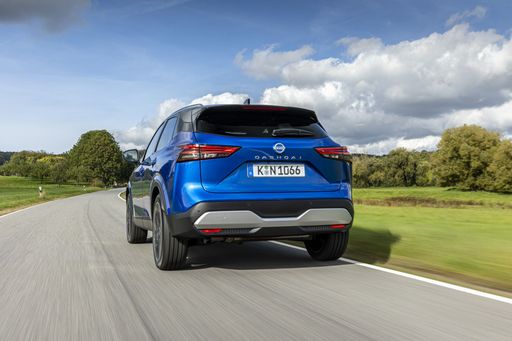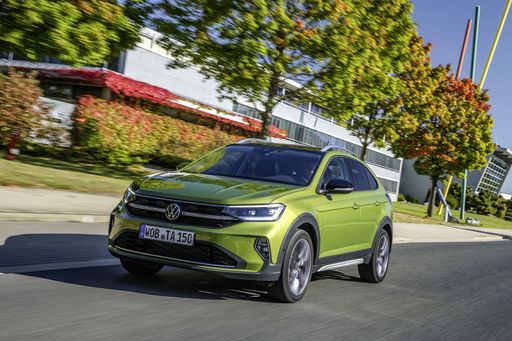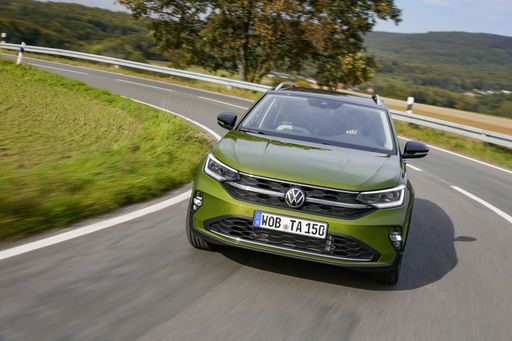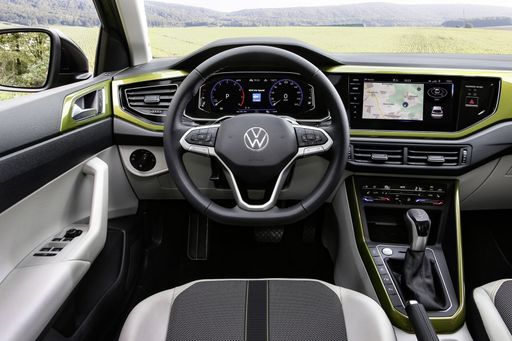Nissan Qashqai vs VW Taigo - Differences and prices compared
Compare performance (205 HP vs 150 HP), boot space and price (29600 £ vs 19900 £ ) at a glance. Find out which car is the better choice for you – Nissan Qashqai or VW Taigo?
Costs and Efficiency:
Price and efficiency are often the first things buyers look at. Here it becomes clear which model has the long-term edge – whether at the pump, the plug, or in purchase price.
VW Taigo has a clearly advantage in terms of price – it starts at 19900 £ , while the Nissan Qashqai costs 29600 £ . That’s a price difference of around 9685 £.
Fuel consumption also shows a difference: Nissan Qashqai manages with 4.50 L and is therefore somewhat more efficient than the VW Taigo with 5.30 L. The difference is about 0.80 L per 100 km.
Engine and Performance:
Power, torque and acceleration are the classic benchmarks for car enthusiasts – and here, some clear differences start to show.
When it comes to engine power, the Nissan Qashqai has a evident edge – offering 205 HP compared to 150 HP. That’s roughly 55 HP more horsepower.
In acceleration from 0 to 100 km/h, the Nissan Qashqai is hardly perceptible quicker – completing the sprint in 7.60 s, while the VW Taigo takes 8.20 s. That’s about 0.60 s faster.
There’s also a difference in torque: Nissan Qashqai pulls noticeable stronger with 330 Nm compared to 250 Nm. That’s about 80 Nm difference.
Space and Everyday Use:
Beyond pure performance, interior space and usability matter most in daily life. This is where you see which car is more practical and versatile.
Both vehicles offer seating for 5 people.
In curb weight, VW Taigo is to a small extent lighter – 1229 kg compared to 1420 kg. The difference is around 191 kg.
In terms of boot space, the Nissan Qashqai offers somewhat more room – 504 L compared to 440 L. That’s a difference of about 64 L.
When it comes to payload, Nissan Qashqai somewhat takes the win – 520 kg compared to 457 kg. That’s a difference of about 63 kg.
Who wins the race in the data check?
The Nissan Qashqai holds a decisive overall lead in the objective data comparison.
This result only shows which model scores more points on paper – not which of the two cars feels right for you.
Costs and Consumption
View detailed analysis
Engine and Performance
View detailed analysis
Dimensions and Body
View detailed analysis

Nissan Qashqai
Nissan Qashqai
The Nissan Qashqai blends practical, family-friendly packaging with SUV styling that refuses to shout, making it a sensible and dependable choice for everyday life. It’s comfortable to live with, economical on the road, and neatly equipped enough to feel modern without ever feeling precious — perfect if you want crossover versatility without the drama.
details




VW Taigo
The VW Taigo brings coupe-like flair to the compact crossover scene with sharp styling and an interior that punches above its price, feeling smarter than you’d expect. It’s an easygoing daily companion that balances comfort and practicality with a playful wink, perfect for city drivers who want something livelier than a regular hatchback.
details




Costs and Consumption |
|
|---|---|
|
Price
29600 - 39900 £
|
Price
19900 - 31800 £
|
|
Consumption L/100km
4.5 - 6.8 L
|
Consumption L/100km
5.3 - 5.8 L
|
|
Consumption kWh/100km
-
|
Consumption kWh/100km
-
|
|
Electric Range
-
|
Electric Range
-
|
|
Battery Capacity
-
|
Battery Capacity
-
|
|
co2
102 - 154 g/km
|
co2
120 - 132 g/km
|
|
Fuel tank capacity
55 L
|
Fuel tank capacity
-
|
Dimensions and Body |
|
|---|---|
|
Body Type
SUV
|
Body Type
SUV
|
|
Seats
5
|
Seats
5
|
|
Doors
5
|
Doors
-
|
|
Curb weight
1420 - 1665 kg
|
Curb weight
1229 - 1302 kg
|
|
Trunk capacity
479 - 504 L
|
Trunk capacity
440 L
|
|
Length
4425 mm
|
Length
-
|
|
Width
1835 mm
|
Width
1757 mm
|
|
Height
1625 mm
|
Height
-
|
|
Max trunk capacity
1422 - 1447 L
|
Max trunk capacity
-
|
|
Payload
466 - 520 kg
|
Payload
448 - 457 kg
|
Engine and Performance |
|
|---|---|
|
Engine Type
Petrol MHEV, Full Hybrid
|
Engine Type
Petrol
|
|
Transmission
Manuel, Automatic
|
Transmission
Manuel, Automatic
|
|
Transmission Detail
Manual Gearbox, CVT, Reduction Gearbox
|
Transmission Detail
Manual Gearbox, Dual-Clutch Automatic
|
|
Drive Type
Front-Wheel Drive, All-Wheel Drive
|
Drive Type
Front-Wheel Drive
|
|
Power HP
140 - 205 HP
|
Power HP
95 - 150 HP
|
|
Acceleration 0-100km/h
7.6 - 10.2 s
|
Acceleration 0-100km/h
8.2 - 11.1 s
|
|
Max Speed
170 - 206 km/h
|
Max Speed
-
|
|
Torque
240 - 330 Nm
|
Torque
175 - 250 Nm
|
|
Number of Cylinders
3 - 4
|
Number of Cylinders
3 - 4
|
|
Power kW
103 - 151 kW
|
Power kW
70 - 110 kW
|
|
Engine capacity
1332 - 1498 cm3
|
Engine capacity
999 - 1498 cm3
|
General |
|
|---|---|
|
Model Year
2025
|
Model Year
2024 - 2025
|
|
CO2 Efficiency Class
E, C
|
CO2 Efficiency Class
D
|
|
Brand
Nissan
|
Brand
VW
|
Is the Nissan Qashqai offered with different drivetrains?
Available configurations include Front-Wheel Drive or All-Wheel Drive.




